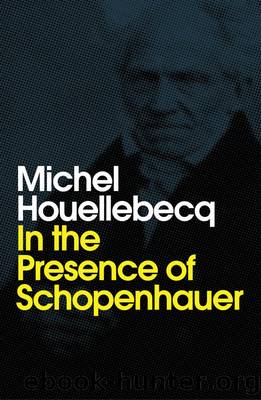In the Presence of Schopenhauer by Michel Houellebecq

Author:Michel Houellebecq [Houellebecq, Michel]
Language: eng
Format: epub
Publisher: Wiley
Published: 2019-07-11T00:00:00+00:00
Notes
1 The World as Will and Representation, Book 3, Chapter 34.
2 Ibid., Book 3, Chapter 36.
3 Ibid., Book 3, Chapter 39.
4 Houellebecq uses ‘le joli’ for Schopenhauer’s ‘das Reizende’, which can also be translated as ‘the attractive’, ‘the stimulating’, ‘the alluring’. (Translator’s note.)
5 The World as Will and Representation, Book 3, Chapter 40.
6 Ibid.
7 Ibid., Book 3, Chapter 49.
Chapter 3
In this way the will to live objectifies itself
When we consider things attentively, when we see the powerful, irresistible impulse with which waterfalls rush to the depths of the Earth, how the magnet always turns to the magnetic pole and iron rushes towards the magnet; when we note the violence with which two electric poles try to unite, a violence further intensified by obstacles, as are human desires; when we observe the suddenness of crystallization and its regularity, which is merely the abrupt cessation of a movement in different directions, a movement subject, when it solidifies, to rigorous laws; when we notice the way in which bodies released from the solid state and returned to the freedom of the fluid state seek each other or flee each other, unite or separate; when, finally, we notice how a burden whose attraction towards the Earth is blocked by our body weighs down and presses continually on that body in its attempt to follow its own course; then we will not need any great stretch of imagination to recognize, albeit from a great distance, our own essence, the very same essence which, within ourselves, pursues its goals enlightened by knowledge, but which here, in the weakest of its manifestations, strives blindly, dully and invariably, and which nevertheless, because it is everywhere one and the same – as the first light of dawn shares the name of sunlight with the full brightness of noon – must here too bear the name of will, which refers to the being of every thing in the world and the unique core of every phenomenon.1
This passage is typical of Schopenhauer’s artistic manner; he sets out to make us feel an analogy which has been revealed to him by prolonged and profound contemplation. But it could all be done in exactly the opposite way. Consider the spontaneous, innocent, quite instinctive desire which attracts us to a girl with a nice figure; then, on the contrary, observe the involuntary recoil that paralyses us in the presence of danger, the fear that grips us at the prospect of physical pain: how can we not recognize, mediated by reason, and rendered accessible and expressible by language, the elementary powers of natural forces, acting eternally and invariably? This is no more an anthropomorphization of the world than it is a mechanization of human passions; it is a matter of recognizing what is identical beyond the appearances, and justifying the main audacious stroke on which the whole system rests, namely the use of introspection as a method of metaphysical investigation.
Spinoza says (letter 62) that a stone hurled into the air would, if it were conscious, have the impression of moving of its own will.
Download
This site does not store any files on its server. We only index and link to content provided by other sites. Please contact the content providers to delete copyright contents if any and email us, we'll remove relevant links or contents immediately.
| Books & Reading | Comparative Literature |
| Criticism & Theory | Genres & Styles |
| Movements & Periods | Reference |
| Regional & Cultural | Women Authors |
4 3 2 1: A Novel by Paul Auster(11047)
The handmaid's tale by Margaret Atwood(6852)
Giovanni's Room by James Baldwin(5877)
Big Magic: Creative Living Beyond Fear by Elizabeth Gilbert(4723)
Asking the Right Questions: A Guide to Critical Thinking by M. Neil Browne & Stuart M. Keeley(4574)
On Writing A Memoir of the Craft by Stephen King(4213)
Ego Is the Enemy by Ryan Holiday(3991)
Ken Follett - World without end by Ken Follett(3972)
The Body: A Guide for Occupants by Bill Bryson(3800)
Bluets by Maggie Nelson(3709)
Adulting by Kelly Williams Brown(3669)
Guilty Pleasures by Laurell K Hamilton(3586)
Eat That Frog! by Brian Tracy(3514)
White Noise - A Novel by Don DeLillo(3434)
The Poetry of Pablo Neruda by Pablo Neruda(3366)
Alive: The Story of the Andes Survivors by Piers Paul Read(3310)
The Bookshop by Penelope Fitzgerald(3225)
The Book of Joy by Dalai Lama(3217)
Fingerprints of the Gods by Graham Hancock(3212)
